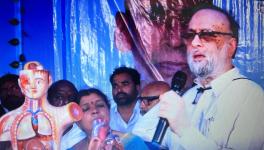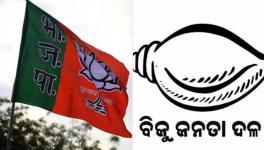People’s Science Congress Opposes Centre’s Project on Racial Purity

The All India People’s Science Congress (AIPSC) has unanimously opposed the Union ministry of culture’s project on studying genetic similarities and differences in the DNA profiling of Indian population groups.
On the concluding day of the 17th four-day Congress in Bhopal on Thursday, the member adopted a resolution saying: “The 17th AIPSC strongly condemns any present or future project related to race, especially one for studying racial purity.” It was no coincidence that the last day coincided with the anniversary of Birsa Munda.
Starting with the theme of ‘The Idea of India @75’, nine sub-plenaries and 22 workshops on scientific temper, education and the New Education Policy 2020, health, self-reliance, gender and social justice, environment, livelihood and privatisation of public sector units were held in four days. Several grassroots activists from states, scientists and other subject experts participated in the discussion.
The AIPSC concluded with the keynote address by professors Sonajharia Minz, Faizan Mustafa, Satyajit Rath and R. Ramanujam, and former Madhya Pradesh chief minister Digvijay Singh.
Asha Mishra, the new general secretary of the All India People’s Science Network (AIPSN), explained that the purpose of the Congress was to review the government work done in the past two years and chalk out a future course of action and intervention at the policy level. She mentioned the three recommendations of the Congress:
-
The Centre and state governments need to ensure that scientific temper is inculcated and the AIPSN would work towards this.
-
A number of state policies, be those in the area of environment, education, health, livelihood or gender, are anti-people. The AIPSN will work on these issues and keep engaging with the governments to make pro-people policies.
-
The AIPSN would bring forth an alternative framework in all crucial areas and work towards providing these.
Minz, the V-C of Sido Kanhu Murmu University, congratulated the AIPSN for tirelessly working towards inculcating scientific temper among people and bridging the gap between the lab and the ground. “A two-way flow in the exchange of knowledge between scientists and people must be ensured. Indigenous groups, tribals and other communities have immense knowledge and we need to acknowledge and mainstream that,” she said.
Emphasising that a particular development model can’t be imposed on people, Minz said, “Tribes and other communities have survived for centuries and they have their own model of development. We have an equal share of resources of land, opportunities and space to work and live with dignity. Perhaps, it is time to revisit the definition of development itself.”
Mustafa, the V-C of NALSAR University, said that “justice has to be the basis” of law. “But today, power has become the basis of law. A society which is afraid of people speaking up cannot move forward,” he said elaborating how during Constituent Assembly debates, the members deliberated on how the Preamble should begin—with the word ‘God’ or ‘People’. “The issue was put to vote and eventually ‘We the People’ won the dual.”
Mentioning how the Constitution has amalgamated different aspects—Fundamental Rights and Fundamental Duties—Mustafa said, “The Constitution demands that people think and think rationally.” He also stressed that “control does not create knowledge or innovation. Dissent is the first step towards it. All scientific discoveries are the result of dissent from the existing knowledge”.
Explaining how understanding the “nexus between the state, religion and corporate entities” is necessary, Mustafa said, “We can work towards countering this and make society more just, equal and rational.”
Singh, a member of the Rajya Sabha, pointed out the “use of religion in controlling” people. “When faith is used as a weapon, it becomes dangerous. It is only through scientific temper that communal frenzy can be tackled,” he said. Expressing concern over the declining trend in public expenditure on research, he said, “The quality of research is also declining as incentivisation of research is missing. Moreover, academics and research have been kept apart. Research has to be part of higher education.”
Singh concluded that “we need to be very vigilant. Unless people and the scientific community come together and oppose communal frenzy and Hindutva, the situation will worsen”.
Satyajit Rath, a faculty member of IISER, Pune, and the new president of AISPN, said that it is “wrong to say that we need to take scientific temper and scientific thought to the people. It implies that people or communities at large do not have scientific temper to start with. It is essential to remind people and communities that in every aspect of life, scientific temper and thought are their own heritage. Through this heritage, the ruling class and the oppressors have misguided and deluded people and created inequities. And people need to come out of that delusion.”
Stressing that the “scientific community needs to act as a catalyst,” Rath said, “This entire enterprise is a deeply political enterprise. This is a struggle against elite exploitation of all sorts. Through this, we are not disrespecting the traditions. We need to discuss and debate those traditional things that do not stand the test of evidence and logic. We need to walk with people and not teach them. Had comrade Amit Sengupta been here today, he would have said that it is important to leave the scientific laboratories and come on the streets—reclaim people’s science in communities in opposition to exploitative tendencies”.
As part of the closing ceremony, a calendar on Makhdoom Mohiuddin, a renowned Urdu poet and leader of the Progressive Writers Union, designed by Jan Vigyan Vedika, Andhra Pradesh, was released.
At the end of the Congress, the Amit Sengupta Parisar at the Extol College reverberated with the song: Tu zinda hai toh zindagi ki jeet par yaqeen kar… (If you are alive, celebrate the victory over life…).
Get the latest reports & analysis with people's perspective on Protests, movements & deep analytical videos, discussions of the current affairs in your Telegram app. Subscribe to NewsClick's Telegram channel & get Real-Time updates on stories, as they get published on our website.
























